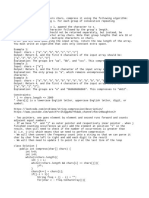0 ratings0% found this document useful (0 votes)
28 viewsJava Beginner Guide
The document describes a function that accepts a character array, start position, and length. It should return a substring of the given length starting from the start position, or null if the start/length are invalid. It provides examples of expected returns for different inputs. A solution is given that implements the function by checking for invalid start/length, creating a substring array, and copying characters from the original array.
Uploaded by
Shafiqul IslamCopyright
© © All Rights Reserved
We take content rights seriously. If you suspect this is your content, claim it here.
Available Formats
Download as DOCX, PDF, TXT or read online on Scribd
0 ratings0% found this document useful (0 votes)
28 viewsJava Beginner Guide
The document describes a function that accepts a character array, start position, and length. It should return a substring of the given length starting from the start position, or null if the start/length are invalid. It provides examples of expected returns for different inputs. A solution is given that implements the function by checking for invalid start/length, creating a substring array, and copying characters from the original array.
Uploaded by
Shafiqul IslamCopyright
© © All Rights Reserved
We take content rights seriously. If you suspect this is your content, claim it here.
Available Formats
Download as DOCX, PDF, TXT or read online on Scribd
You are on page 1/ 2
3.
Write a function that accepts a character array, a zero-based start position and a
length. It should return a character array containing containing lengthcharacters
starting with the startcharacter of the input array. The function should do error
checking on the start position and the length and return null if the either value is not legal.
The function signature is:
char[ ] f(char[ ] a, int start, int len)
Examples
if input parameters are return
{‘a’, ‘b’, ‘c’}, 0, 4 null
{‘a’, ‘b’, ‘c’}, 0, 3 {‘a’, ‘b’, ‘c’}
{‘a’, ‘b’, ‘c’}, 0, 2 {‘a’, ‘b’}
{‘a’, ‘b’, ‘c’}, 0, 1 {‘a’}
{‘a’, ‘b’, ‘c’}, 1, 3 null
{‘a’, ‘b’, ‘c’}, 1, 2 {‘b’, ‘c’}
{‘a’, ‘b’, ‘c’}, 1, 1 {‘b’}
{‘a’, ‘b’, ‘c’}, 2, 2 null
{‘a’, ‘b’, ‘c’}, 2, 1 {‘c’}
{‘a’, ‘b’, ‘c’}, 3, 1 null
{‘a’, ‘b’, ‘c’}, 1, 0 {}
{‘a’, ‘b’, ‘c’}, -1, 2 null
{‘a’, ‘b’, ‘c’}, -1, -2 null
{}, 0, 1 null
Solution:
static char[] a3(char[] a, int start, int length)
{
if (length < 0 || start < 0 || start+length-1>=a.length)
{
return null;
}
char[] sub = new char[length];
for (int i=start, j=0; j<length; i++, j++)
{
sub[j] = a[i];
}
return sub;
}
You might also like
- Accenture Coding Questions With Answers: Q1. Binary String Operations25% (4)Accenture Coding Questions With Answers: Q1. Binary String Operations11 pages
- A3 ( A, Start, Length) ( (Length A.length) ( ) Sub (Length) (I Start, J 0 J Length I++, J++) (Sub (J) A (I) )No ratings yetA3 ( A, Start, Length) ( (Length A.length) ( ) Sub (Length) (I Start, J 0 J Length I++, J++) (Sub (J) A (I) )2 pages
- Mum Test: If You Are Using C or C++, The Signature of The Function IsNo ratings yetMum Test: If You Are Using C or C++, The Signature of The Function Is7 pages
- Assignment 10 - Recursion & Practice Problems (No Submission)No ratings yetAssignment 10 - Recursion & Practice Problems (No Submission)11 pages
- STUDENT ID: 25211207696: Exercise (Lab) 6No ratings yetSTUDENT ID: 25211207696: Exercise (Lab) 66 pages
- Q.1 Design A Program For Creating A Machine That Accept Three Consecutive Ones. Program50% (2)Q.1 Design A Program For Creating A Machine That Accept Three Consecutive Ones. Program44 pages
- 50. PRACTICE QUESTION ON ARRAY AND STRINGNo ratings yet50. PRACTICE QUESTION ON ARRAY AND STRING59 pages
- Exercise 4 - Checking A Palindrome Using StacksNo ratings yetExercise 4 - Checking A Palindrome Using Stacks6 pages
- Computer Science & Engineering: Department ofNo ratings yetComputer Science & Engineering: Department of5 pages
- Notes in Additional Mathematics with Examples and ExercisesFrom EverandNotes in Additional Mathematics with Examples and ExercisesNo ratings yet
- Latest Trends-Progressive Web ApplicationsNo ratings yetLatest Trends-Progressive Web Applications2 pages
- Latest Trends-Artificial Intelligence (AI) and BotsNo ratings yetLatest Trends-Artificial Intelligence (AI) and Bots2 pages
- Java Constructor: 1 Prepared By: Md. Saidur RahmanNo ratings yetJava Constructor: 1 Prepared By: Md. Saidur Rahman7 pages
- SL Task Title Time Line Status: RequirementsNo ratings yetSL Task Title Time Line Status: Requirements1 page
- Introduction To JAVA: Instructor: Md. Saidur Rahman Sun Certified Java Programmer (SCJP) EmailNo ratings yetIntroduction To JAVA: Instructor: Md. Saidur Rahman Sun Certified Java Programmer (SCJP) Email11 pages
- Java Thread: A Thread That Is Created Whenever A JVM StartsNo ratings yetJava Thread: A Thread That Is Created Whenever A JVM Starts3 pages










































































